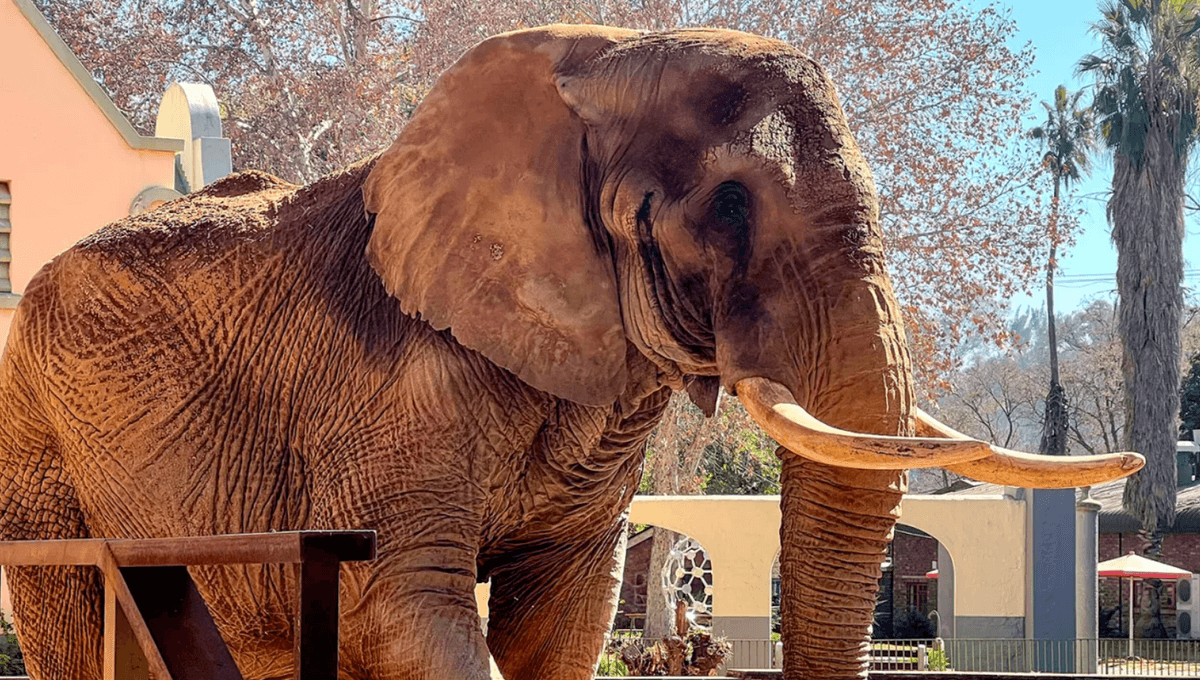
After 40 years of captivity, the last elephant in South Africa’s only national zoo has been freed and will live the rest of his life in a 10,000-hectare (24,700-acre) game reserve.
Charlie (sometimes spelled Charley) was the last African elephant in the National Zoological Gardens in Pretoria, South Africa’s only national zoo.
He was taken from his family in the wilderness of Zimbabwe when he was around two years old. His captors sold him to the Boswell Wilkie Circus in 1984 where he was used to perform circus tricks to gawking audiences. In 2001, he was then moved to the zoo in Pretoria where he has remained ever since.
While some other South African zoos still host elephants, such as Johannesburg Zoo, Charlie was the last remaining one at the National Zoological Gardens in Pretoria.
Now, he starts the next chapter of his life. The EMS Foundation has announced that Charlie recently made a 4-hour journey from the zoo to the Shambala Private Reserve in Limpopo.
“The decision was made more than a year ago to retire Charley. Among a number of factors that were considered was his advanced age,” Nontsikelelo Mpulo, Director of Marketing, Communication and Commercialisation at the South African National Biodiversity Institute (SANBI), said in a statement.
“Potential host facilities responded to a call for expressions of interest about providing a retirement home for Charley. Having interrogated the responses, the proposal from the EMS Foundation and Shambala Private Game Reserve to accommodate Charley in his retirement was approved,” Mpulo explained.
Together with the EMS Foundation and Four Paws, the Shambala Private Game Reserve has put together a scheme to help Charlie settle into his new home. He has never fended for himself, so the plan will help him reintegrate into a natural environment. The Shambala Reserve has also agreed to share regular health reports with the SANBI for at least a year following his arrival to ensure continued oversight and care.
Charlie will initially be kept by himself while he adjusts to his new living conditions, but the hope is that he will be eventually integrated into Shambala’s resident elephant herd.
“Our dream is that at his own pace, Charlie will learn to be the elephant he was always meant to be, and that soon, he will meet up and integrate into the existing elephant community on Shambala,” the EMS Foundation said in a statement.
There are an estimated 15,000 to 20,000 captive elephants around the world, many of which are held in “abysmal” conditions, according to Elephant Voices.
There’s a huge debate about whether these majestic creatures are suited to life in captivity. Elephants can roam up to 80 kilometers (50 miles) every day, which is impossible to achieve in a closed zoo exhibit. Unable to wander constantly, many elephants in captivity develop health problems due to inactivity. Likewise, elephants also maintain very complex social structures, which are hard to replicate in captivity.
All of this is reflected in their average lifespan: captive elephants die at around 40 years old, while wild ones can live into their 70s.
On the other side of the argument, many zoos claim they have a unique opportunity to advance the conservation and scientific knowledge of elephants. Captive elephants are also guarded from many of their biggest threats, namely habitat loss, poaching, and conflicts with humans.
“I would rather have elephants in zoos than have them go extinct,” Robert Hoage, a former public affairs director at the Smithsonian’s National Zoo in Washington DC, told the journal BioScience in 2006.
“If zoos don’t get involved, elephants might exist just in museums. Zoos are not great places for elephants, but they are better [there] than dead,” Hoage added.
Source Link: Charlie, The Last Elephant At South Africa's National Zoo, Freed After 40 Years Of Captivity